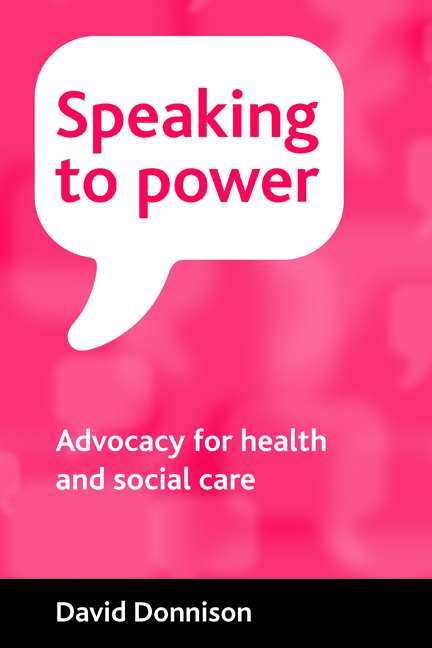Book contents
- Frontmatter
- Dedication
- Contents
- Why and how we wrote this book
- Introduction
- one Origins of advocacy
- two Scotland gives a lead
- three What advocates do: their main clients
- four What advocates do: questions and dilemmas
- five Groups and communities
- six Setting up an advocacy project and running it
- seven Volunteers
- eight Making advocacy accountable
- nine Roadblocks
- ten Looking ahead
- Further reading
- Index
- Frontmatter
- Dedication
- Contents
- Why and how we wrote this book
- Introduction
- one Origins of advocacy
- two Scotland gives a lead
- three What advocates do: their main clients
- four What advocates do: questions and dilemmas
- five Groups and communities
- six Setting up an advocacy project and running it
- seven Volunteers
- eight Making advocacy accountable
- nine Roadblocks
- ten Looking ahead
- Further reading
- Index
Summary
Introduction
The agency whose advocates provided most of the examples discussed in the last three chapters is typical of Scotland's advocacy services in relying on volunteers to do a lot of its work. Four of the clients described in earlier chapters were represented by volunteers. Some volunteers join the paid staff for temporary spells to fill gaps in the service that arise when paid workers are on leave or off sick and some of them move into paid jobs when the agency can recruit more staff. Meanwhile, some paid staff work as volunteers for other agencies. So there is no clear-cut distinction between the two.
Much of the advocacy already going on in Scotland before this service was set up by the Mental Health Act of 2003 had always been done by volunteers. The new service could not have got going so quickly without their help. Moreover, in remote and sparsely populated places – on islands, for example, where there may be no more than one or two people a year asking for an advocate's help – it will always be difficult to offer a service provided by paid staff. It is much better to train and support local volunteers. We believe there are more reasons why volunteers should always play a large part in our work – reasons that will become clear later in this chapter. Thus the service cannot be properly described without explaining how these volunteers are recruited, trained and supported in their work. As we explore these things we will find that they pose larger questions about a society's capacity to respond to the needs of its most vulnerable citizens.
How we made a study
The agency providing the evidence for this Chapter had, by the year 2007, trained more than 400 people in short courses, each lasting for about half a day every week for five or six weeks. These courses, taught by the agency's more experienced advocates, had been offered over the previous eight years in seven different places scattered across its large territory. (To drive from one end of it to the other takes about three hours.)
- Type
- Chapter
- Information
- Speaking to PowerAdvocacy for Health and Social Care, pp. 109 - 124Publisher: Bristol University PressPrint publication year: 2009

